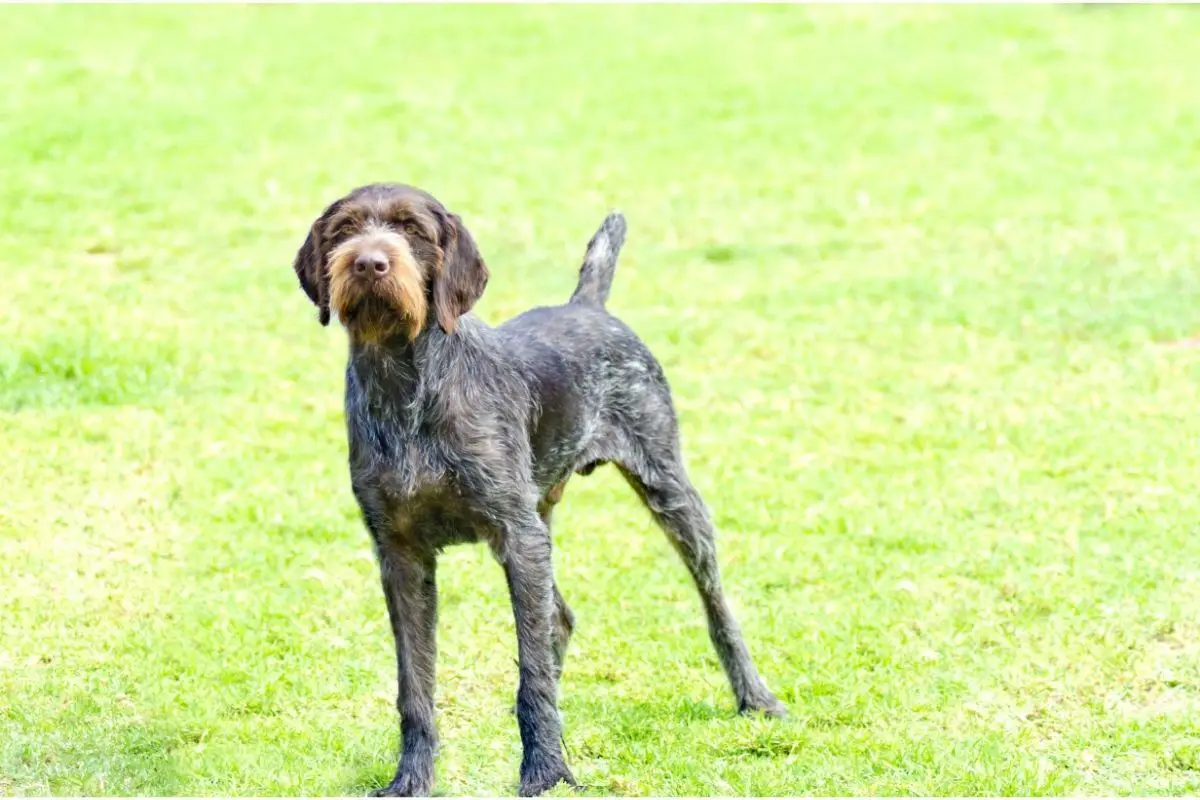The German Wirehaired Pointer is a medium-sized hunting dog that originated in Germany and was brought over to America by hunters who wanted a companion canine that could hunt with them.
The breed has been around since the early 1900s and has become an incredibly popular breed of dog.

They are often used for tracking and retrieving game whilst hunting, such as rabbits, birds, squirrels, and other small animals.
This dog breed is also known for their friendly nature and loveable personality. They can make for great family dogs as long as they can be given the right care and attention, such as getting regular exercise.
We are going to be looking into this dog breed in a little more detail to find out whether or not they can be considered a hypoallergenic dog breed.
Hypoallergenic Animals
A hypoallergenic animal means that the animal does not cause as many allergic reactions in people who suffer from allergies.
Allergies occur when certain proteins found on the surface of pollen grains stick to the lining of our nasal passages and trigger an immune response.
These allergens are called antigens, and they are usually proteins that can come from plants, insects, molds, dust, or even food.
When we inhale these antigens, our bodies react to them as if they were foreign invaders and produce antibodies against them.
Antibodies then travel through our bloodstream, where they attack the cells that contain those antigens.
This process causes inflammation and swelling which results in symptoms like sneezing, watery eyes, runny nose, and itching.
Some of the most common allergens include grasses, trees, weeds, mold spores, house dust mites, cockroaches, and pets like cats and dogs.
Hypoallergenic Dogs
When it comes to hypoallergenic dogs, there are breeds that have been bred specifically to be less likely to cause allergies in humans, and there are breeds that just happen to naturally produce fewer allergens than others.
In order to determine which type of hypoallergenic breed you would want to get, you will need to do your research.
You should first ask yourself what kind of allergy problems you might have. If you have asthma, eczema, hay fever, or any other condition that is easily irritated by various allergens, you may want to consider getting a hypoallergenic dog breed.
However, if you don’t have any allergies any dog breed would be fine, even those that produce more allergens.
There are many different factors that go into determining how hypoallergenic a particular breed is. One of the main things to consider is the amount of protein produced by the skin of each individual dog.
Certain breeds produce more protein than others because of their coat type. For example, some breeds have very thick coats that trap lots of dirt and debris inside their fur, while others have thinner coats that allow air to flow more freely.
Another factor is the way that the hair grows on the body. Some breeds grow their hair straight down, while others grow in curls.
Curly coated breeds tend to shed less, but they also require more grooming. Other factors include the size of the dog’s ears and nose, the length of their tails, and the number of times that they shed their coat.
Each of these factors contributes to the overall health of the dog and its ability to produce allergens.
The best way to find out whether a specific breed produces more or fewer allergens than another is to talk to your veterinarian about it.
Your vet will be able to tell you exactly what kinds of allergens are present in the environment around your home, and they will be able to help you decide which breed would work best for your family.
It is important to note that no matter which breed you choose, you still have to keep your pet clean.
Even though a hypoallergenic dog breed may produce fewer allergens than other breeds, it is still possible to develop allergies if you aren’t careful with your pet’s hygiene.
Regular grooming and bathing will keep your pet happy and healthy too!
Is The German Wirehaired Pointer Hypoallergenic?
Before we answer this question, it is essential to examine the wiry coat of this particular breed, as dog coats can create pet dander, which can be the cause of problems in allergy sufferers.
German Wirehaired Pointers have a double coat consisting of a dense undercoat and an outer coat.
In addition to being very soft and thick, their coats are also long and straight. Their hair sheds less than other dogs, making it easier to keep clean and maintain.
It’s important to brush your dog regularly to prevent matting and tangles from forming.
If you notice any signs of excessive shedding, take your dog to a groomer immediately so that they can get rid of dead or loose hair before it starts to accumulate.
The German Wirehaired Pointer is not technically a hypoallergenic breed of dog, but they are definitely not as problematic as some breeds for those with allergies, as they do not shed their coats very often.
This means that they will not leave behind large amounts of dander on your furniture or carpets.
In fact, it is actually quite difficult to determine whether or not any particular animal is hypoallergenic because there are so many factors involved.
If you want to know whether or not this dog breed is truly hypoallergenic, you should consider the following:
- Does the coat of this dog breed contain high levels of protein? High levels of protein mean that the animal sheds less frequently.
- How long does your dog’s coat grow before it starts to shed? Longer coats mean that a dog will shed less regularly.
- What kind of grooming products are available for this dog breed? If you can find products that remove the dander without harming the skin, then you can consider this dog breed hypoallergenic!
- Is the animal kept indoors or outdoors? Indoor animals tend to shed less often than outdoor ones.
- Do you live in an area where there are lots of allergens? Areas with higher concentrations of allergens will make it more likely that your home will become contaminated by airborne particles.
- Are you able to keep up with regular cleaning? Regular cleaning is essential for keeping your home free of allergens as well as keeping your pup healthy.
- Can you avoid contact with the animal? Animals that spend time in cages or kennels may also be prone to developing allergies.
- Are you able to control the environment around the animal? If you cannot control the air quality in your home, such as with a dehumidifier, then you should probably reconsider owning this dog breed.
- Has anyone else in your family had trouble with allergies? If you notice that someone in your household has developed allergies, then you should probably steer clear of a particular dog breed.
Can I Keep a German Wirehaired Pointer If I Have Allergies?

Yes, if you have allergies, you can still own a German Wirehaired Pointer. However, you should try to limit your exposure to them if you have particularly bad allergies.
You might need to use a different type of carpeting or even completely replace your furniture with something that is made of synthetic materials.
Make sure that you always wash your hands after handling your dog, and always wear gloves when grooming and bathing them, especially if you are prone to skin allergies.
If you notice that you or anyone in your home has allergies that are flaring up, consult your doctor.
Grooming Tips for the German Wirehaired Pointer
If you are set on keeping this breed of dog, even if you are someone who suffers from pet allergies.
Then there are ways that you can avoid an allergic reaction, such as cleaning the house regularly, changing your and your dog’s bedding regularly, and using allergy-friendly shampoo.
It is also essential to be aware of the proper grooming routine for this breed if you suffer from allergies, so let’s take a look.
Seeing as the German Wirehaired Pointer’s hair is extremely thick and dense, it takes a lot of effort to groom these dogs properly.
Regular brushing is a necessity that can help get rid of dead cells and bacteria in your dog’s coat, which could potentially cause infections.
Once you have brushed your dog, comb their fur carefully. Be careful not to pull too hard on the hair because this can damage the skin.
When you are done combing, you should rinse your dog thoroughly under warm water. After rinsing, dry your dog using a towel.
Final Thoughts
You can certainly keep a German Wirehaired Pointer as a pet if you have allergies, as long as you are willing to put some extra work into caring for your pet as well as keeping yourself safe.
The best way to ensure that your pet stays healthy is to clean your house regularly, change your pet’s bedding often and keep track of any factors that cause allergy flare-ups.
This breed is pretty good for people with allergies, but you should still be cautious about potential triggers like dust mites and pollen.
If you are going to consider getting one of these dogs, make sure that you do your research first.
